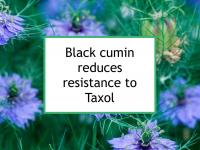Black cumin (Nigella sativa) seeds are used as a spice primarily in Indian and Middle Eastern cooking. Thymoquinone, the major bioactive compound in black cumin, has been shown to have anti-cancer activity in both cell and animal models of triple negative (ER-/PR-/HER2-) and hormone receptor positive (ER+/PR+) breast cancer.
Thymoquinone promotes programmed cell death in breast cancer cells and has been shown to inhibit breast cancer cell proliferation, migration, and invasion. In addition, thymoquinone has been demonstrated to reduce metastasis to lungs, brain and bone in a mouse model of breast cancer.
Thymoquinone has also been shown to potentiate chemotherapy, including doxorubicin, paclitaxel, docetaxel, cyclophosphamide and cisplatin in hormone receptor positive and triple negative breast cancer models. Thymoquinone has also been shown to radiosensitize ER+/PR+ breast cancer cells, thereby increasing the treatment effects of radiotherapy. In addition, thymoquinone increases the cytotoxic effects of tamoxifen in ER+/PR+ breast cancer. The combination of thymoquinone plus doxorubicin has been found to suppress tumor growth while reducing doxorubicin-induced heart damage (cardiomyopathy) in mice. Now a new study has reported that thymoquinone enhances the treatment effects of paclitaxel by reducing the fraction of treatment-resistant tumor-associated stem cells (rather than by directly increasing paclitaxel's cell killing effects).
Purchasing black cumin
Black cumin, a member of the buttercup family, is available in specialty food stores and online. Black cumin is also known as black seed, Roman coriander, fennel flower, nutmeg flower and black caraway. Hence, it is important to verify that you are purchasing Nigella sativa. Buying organic is best since this reduces the likelihood of contamination or admixture of other spices. Black cumin seeds can be ground and used similarly to black pepper in cooking. Note that black cumin is not related to cumin (Cuminum cyminum), which is a member of the parsley family.
Although black cumin seed oil is available as a supplement, the safety of this more concentrated source of thymoquinone has not been established. Like other compounds with anti-cancer effects found in food, we prefer using thymoquinone at the relatively low dose available in black cumin seeds rather than attempting to obtain pharmacological effects from a higher dose.
Latest research shows how thymoquinone potentiates paclitaxel
The study referenced above was designed to investigate how thymoquinone modifies the treatment effects of paclitaxel chemotherapy in breast cancer cells. The authors first developed cytotoxic profiles of thymoquinone alone and thymoquinone plus paclitaxel in (ER+/PR+/HER2-) MCF-7 and T47D breast cancer cells. Thymoquinone was shown to have cytotoxic effects against the cells. In MCF-7 cells, thymoquinone did not change paclitaxel’s IC50 (the inhibitory concentration needed to achieve 50% cell death), however the combination index was indicative of antagonism. In T47D cells, adding thymoquinone to paclitaxel increased paclitaxel’s IC50 from 90±8 nM to 140±20 nM, again with antagonism.
However, the authors found that thymoquinone completely depleted the remaining paclitaxel-resistant cells in both of the ER+/PR+ cancer cell lines. In addition, cell death (both apoptotic and autophagic) due to the combination of paclitaxel plus thymoquinone was significantly increased in T47D cells compared to paclitaxel treatment alone (by 5.6 fold for apoptotic and 1.7 fold for autophagic cell death). In MCF-7 cells, thymoquinone plus paclitaxel was found to significantly increase autophagic cell death compared to paclitaxel alone.
The authors then assessed the fraction of tumor-associated stem cell clones (CD44(+)/CD24(-)/(low) in samples of MCF-7 and T47D cells before and after treatment. Thymoquinone alone significantly reduced the tumor-associated stem cell clones (by 12.4±0.8%). Combining paclitaxel with thymoquinone further depleted cell clones (by 32.3±0.08%). In addition, thymoquinone alone significantly and favorably altered gene expression associated with cell resistance to paclitaxel. The authors conclude that thymoquinone enhances paclitaxel's anticancer effects in ER+/PR+ breast cancer cells primarily by depleting tumor-associated stem cells rather than by enhancing paclitaxel's direct cell killing effects.
Please see our webpages on black cumin and what to eat while on paclitaxel for more information.
